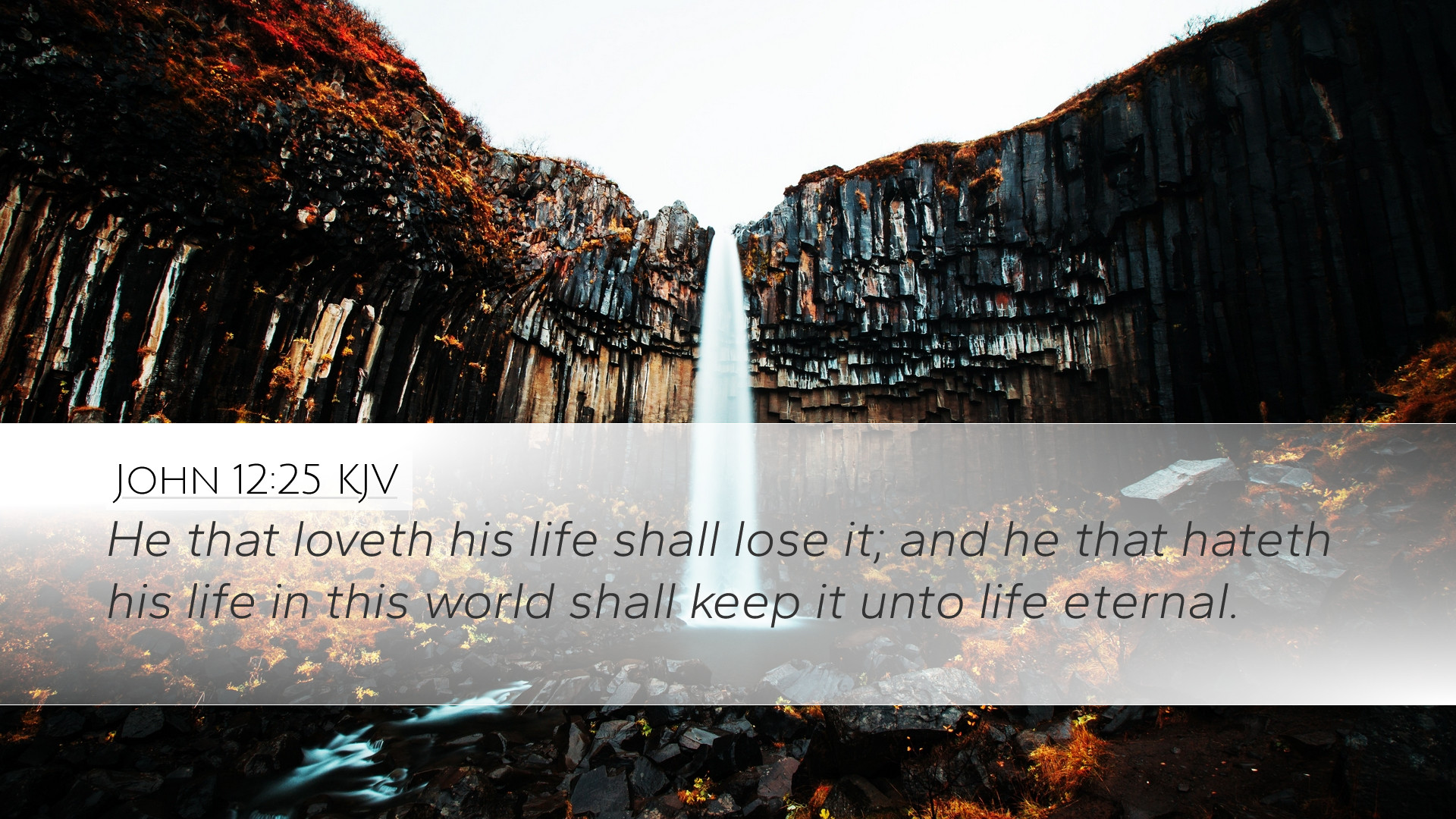Commentary on John 12:25
Verse: “He that loveth his life shall lose it; and he that hateth his life in this world shall keep it unto life eternal.”
Introduction
The verse John 12:25 presents profound theological insights into the nature of life, love, and sacrifice in the context of discipleship. The statements of Jesus challenge the conventional understanding of life and death, as well as the values by which humanity typically measures success and fulfillment. This commentary integrates insights from public domain theologians like Matthew Henry, Albert Barnes, and Adam Clarke to unpack the depth of this verse.
The Duality of Life and Death
Matthew Henry elaborates on the juxtaposition of “loving” and “hating” one's life. He suggests that the term "life" is used here to denote not merely existence but the totality of one’s pursuits, dreams, and comforts. To “love” one’s life is to cling to it and prioritize it above all else, which ultimately leads to spiritual loss. Henry emphasizes that true discipleship requires a radical re-evaluation of what we prioritize in our lives.
Albert Barnes reflects on the existential implications of this principle, explaining that when individuals excessively value their earthly existence, they may fall into the trap of selfishness. This self-centered pursuit, according to Barnes, ultimately results in the loss of true life, which is found in relationship with God. The loss signifies a forfeiture of eternal life in favor of fleeting pleasures.
Adam Clarke interprets "hateth" as a hyperbolic expression indicating preference rather than literal aversion. Clarke points out that Jesus calls His followers to a form of life that prioritizes spiritual realities over worldly attachments. This act of “hating” one’s life represents a total devotion to God, one which leads to the fulfillment of God's eternal promises.
Understanding Life Eternal
This verse ends with the promise of “life eternal,” a theme found throughout the New Testament. Barnes elucidates that this assurance speaks of a life that transcends earthly existence, a life that is characterized by spiritual joy, communion with God, and the absence of suffering. This is the ultimate reward for those who are willing to forsake worldly attachments and pursue righteousness.
Henry emphasizes the contrast between temporal and eternal values, noting that those who embrace the sacrifices inherent in discipleship are promised the fullness of life in eternity. This theological perspective is invaluable for theologians and pastors in understanding the nature of salvation and the cost of discipleship.
The Cost of Discipleship
At the heart of this verse is the call to sacrifice. Clarke connects this teaching to the broader narrative of Jesus’ own passion, where He sacrifices His own life for the salvation of humanity. The willingness to follow Christ often means facing persecution, hardship, and the renunciation of worldly pleasures.
Barnes provides practical insights into how believers can live out this command. He encourages a life that is characterized not by the pursuit of comfort but by a commitment to others and to God’s Kingdom. This self-emptying love manifests itself in service, witness, and the courageous sharing of one's faith.
Conclusion
This verse encapsulates a core principle of Christian living: true fulfillment and life are found not in self-preservation but in self-denial for the sake of Christ. By blending the insights from Matthew Henry, Albert Barnes, and Adam Clarke, we gain a comprehensive understanding of John 12:25 that challenges us to rethink our values and aspirations.
As pastors, students, and theologians, the challenge posed by John 12:25 is significant. It calls for deep reflection not only on personal priorities but also on how we lead and teach others in the faith. This passage invites everyone to embrace the paradox of the Christian life, that in losing ourselves for Christ, we ultimately gain everything.


